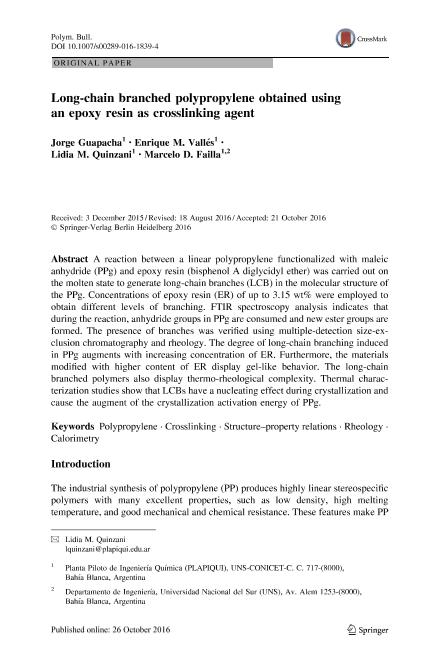Mostrar el registro sencillo del ítem
dc.contributor.author
Guapacha Martínez, Jorge Ariel

dc.contributor.author
Valles, Enrique Marcelo

dc.contributor.author
Quinzani, Lidia Maria

dc.contributor.author
Failla, Marcelo Daniel

dc.date.available
2017-11-16T20:36:25Z
dc.date.issued
2017-06-26
dc.identifier.citation
Guapacha Martínez, Jorge Ariel; Valles, Enrique Marcelo; Quinzani, Lidia Maria; Failla, Marcelo Daniel; Long-chain branched polypropylene obtained using an epoxy resin as crosslinking agent; Springer; Polymer Bulletin; 74; 6; 26-6-2017; 2297–2318
dc.identifier.issn
0170-0839
dc.identifier.uri
http://hdl.handle.net/11336/28391
dc.description.abstract
A reaction between a linear polypropylene functionalized with maleic anhydride (PPg) and epoxy resin (bisphenol A diglycidyl ether) was carried out on the molten state to generate long-chain branches (LCB) in the molecular structure of the PPg. Concentrations of epoxy resin (ER) of up to 3.15 wt% were employed to obtain different levels of branching. FTIR spectroscopy analysis indicates that during the reaction, anhydride groups in PPg are consumed and new ester groups are formed. The presence of branches was verified using multiple-detection size-exclusion chromatography and rheology. The degree of long-chain branching induced in PPg augments with increasing concentration of ER. Furthermore, the materials modified with higher content of ER display gel-like behavior. The long-chain branched polymers also display thermo-rheological complexity. Thermal characterization studies show that LCBs have a nucleating effect during crystallization and cause the augment of the crystallization activation energy of PPg.
dc.format
application/pdf
dc.language.iso
eng
dc.publisher
Springer

dc.rights
info:eu-repo/semantics/openAccess
dc.rights.uri
https://creativecommons.org/licenses/by-nc-sa/2.5/ar/
dc.subject
Polypropylene
dc.subject
Crosslinking
dc.subject
Structure-Property Relations
dc.subject
Rheology
dc.title
Long-chain branched polypropylene obtained using an epoxy resin as crosslinking agent
dc.type
info:eu-repo/semantics/article
dc.type
info:ar-repo/semantics/artículo
dc.type
info:eu-repo/semantics/publishedVersion
dc.date.updated
2017-10-26T14:29:51Z
dc.journal.volume
74
dc.journal.number
6
dc.journal.pagination
2297–2318
dc.journal.pais
Alemania

dc.journal.ciudad
Berlin
dc.description.fil
Fil: Guapacha Martínez, Jorge Ariel. Consejo Nacional de Investigaciones Científicas y Técnicas. Centro Científico Tecnológico Conicet - Bahía Blanca. Planta Piloto de Ingeniería Química. Universidad Nacional del Sur. Planta Piloto de Ingeniería Química; Argentina
dc.description.fil
Fil: Valles, Enrique Marcelo. Consejo Nacional de Investigaciones Científicas y Técnicas. Centro Científico Tecnológico Conicet - Bahía Blanca. Planta Piloto de Ingeniería Química. Universidad Nacional del Sur. Planta Piloto de Ingeniería Química; Argentina
dc.description.fil
Fil: Quinzani, Lidia Maria. Consejo Nacional de Investigaciones Científicas y Técnicas. Centro Científico Tecnológico Conicet - Bahía Blanca. Planta Piloto de Ingeniería Química. Universidad Nacional del Sur. Planta Piloto de Ingeniería Química; Argentina
dc.description.fil
Fil: Failla, Marcelo Daniel. Consejo Nacional de Investigaciones Científicas y Técnicas. Centro Científico Tecnológico Conicet - Bahía Blanca. Planta Piloto de Ingeniería Química. Universidad Nacional del Sur. Planta Piloto de Ingeniería Química; Argentina
dc.journal.title
Polymer Bulletin

dc.relation.alternativeid
info:eu-repo/semantics/altIdentifier/doi/http://dx.doi.org/10.1007/s00289-016-1839-4
dc.relation.alternativeid
info:eu-repo/semantics/altIdentifier/url/https://link.springer.com/article/10.1007/s00289-016-1839-4
Archivos asociados
